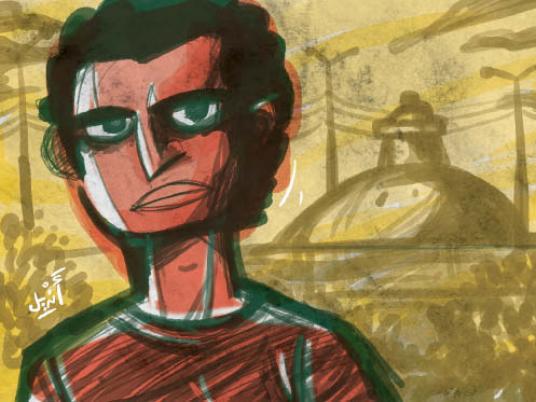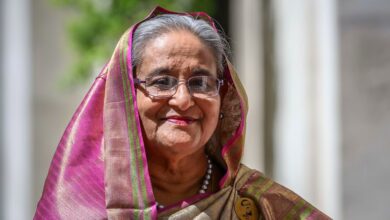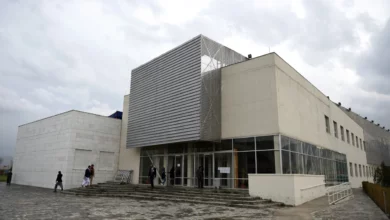
New university bylaws threaten to restrict student activities at higher education institutions, while the body that drafted the regulations is facing questionings of its legitimacy, with students demanding more representation.
Members of student unions and those affiliated with various political groups are furious that the bylaws were not put to a referendum as promised, and instead were ratified by the Egypt Student Union (ESU). An umbrella group, ESU is itself dominated by the Muslim Brotherhood. Students say there is no consensus among the student body for the bylaws, which await approval from President Mohamed Morsy and will then be passed with a presidential decree.
Anger within the student movement has been mounting against the High Council for Universities after it approved the bylaws sanctioned by the ESU but opposed by students of various affiliations, who say they will restricte students’ rights and freedoms.
Questions of legitimacy
Students who oppose the bylaws claim they are illegitimate, since the ESU itself was elected against the will of the student body.
A rift between students belonging to the Muslim Brotherhood and those affiliated with other political groups emerged last year when the Brotherhood agreed to hold student union elections according to the 1979 bylaws. Notoriously known as the “state security bylaws,” these were amended by the late President Anwar Sadat in 1979, allegedly to repress the student movements that participated in the 1977 bread riots two years earlier.
Fatma Serag, a lawyer in the Academic Freedoms Program of the Association for Freedom of Thought and Expression, says most students belonging to political groups boycotted the student union elections last year. Others, she said, were too busy mobilizing for the dismissal of university officials affiliated with former President Hosni Mubarak’s regime.
“Some university deans made [individual] decisions to amend some bylaws and organize elections in an attempt to contain the anger of the student body, including Cairo and Alexandria universities,” Serag says.
She adds that they ended up with a “huge mess” because there was no unified vision among universities and no elections monitoring, and the quorum — 50 percent of registered voters on the first day — was not met.
“Amid this chaos, the ESU was formed from the student unions elected in this period,” Serag says.
The legal question in the establishment of the ESU, Serag argues, is the fact that the 1979 bylaws and the 2007 amendments to them do not allow for its formation. However, it is these very bylaws upon which the current ESU’s formation is based.
“The bylaws through which the ESU was originally formed do not acknowledge its formation. There are no bylaws to regulate its work,” Serag explains.
Dissatisfied, eight student unions withdrew their membership from the ESU shortly after its establishment, leaving it dominated by Brotherhood students. The student unions of Cairo, Ain Shams, Helwan, Banha, Assiut, Port Said, Suez Canal and Monufiya universities all opted out of the ESU.
The problem with the new bylaws, in turn, stems from the legitimacy of the entity that drafted them. Moreover, the promised referendum never materialized, which means the bylaws have not gained students’ approval, and will instead be imposed from above by presidential decree.
“Our main demand is to write new bylaws and get them approved by students,” says Osama Ahmed, a spokesperson for the Revolutionary Socialists. “The bylaws were written by an illegitimate entity that is not representative of students — this is not suitable after a revolution.”
“We do not acknowledge the so-called ESU, and we do not acknowledge the new bylaws,” Ahmed says.
The ESU was supposed to hold a referendum across Egyptian universities, but just 12 hours beforehand, it announced that an opinion poll would be conducted instead. Sohaib Mohamed, ESU vice president and a Brotherhood-affiliated student, says this was due to financial and administrative constraints.
“We really wanted to hold a referendum, but the High Council for Universities said it would be too costly,” he says, adding that some university staff, though not eligible to vote, would have demanded to do so, further delaying the issuance of the new bylaws.
He says opinion polls were conducted at South Valley, Damietta, Damanhour and Banha universities, where 98.5 percent voted in favor of the bylaws. However, the legal mechanism through which the polls were held — including the required quorum and monitoring tools — was not clear.
Moreover, Banha University Student Union head Mohamed Shawky denies that any polls were conducted there.
“All of our discussions were over the Internet. Our university has no problems with the bylaws so there is no need to conduct a poll in the first place,” Shawky says.
But the student unions of Cairo, Ain Shams, Alexandria and Assiut universities oppose the bylaws.
“This is complete disrespect to students,” Ahmed says. “We want an organized referendum across universities after the bylaws are properly discussed in workshops and conferences — not prepared and amended behind closed doors — no matter how much time and money it will cost.”
Fears of restrictions
Unlike the 1979 bylaws and the 2007 amendments, which required permission from the administration to organize a student activity, Article 331 of the new regulations only stipulates notifying the student union.
While this is considered a significant step forward, the same article allows the elected student union to suspend any activity that “violates university customs and traditions,” without defining what may be considered a violation.
“The clause is really open and could be used as a backdoor to restrict the right to organize in universities,” Serag says, adding that it imposes guardianship over students by their peers.
Mohamed says these concerns are unfounded. When the ESU presented the bylaws to the universities’ high council, members presented a definition of the clause. “An activity violating the university’s traditions includes any activity promoting violence, discrimination, sectarianism and commercialism,” he explains.
But the released copy of the bylaws does not include this definition. “It will be added soon, or it is already added to the bylaws,” Mohamed says hesitantly.
Ahmed says further clarification is needed. “What do we mean by commercialism? Students sometimes find creative ways to finance their activities. Some sell brochures or newsletters. Would these activities be banned? The student union should not be the sole financier of activities,” he says.
Article 318 of the bylaws defines student unions as “the legitimate representative of students.” Previously, they were described as “the only legitimate representative of students.”
Although the word “only” was removed, Ahmed argues that the meaning is maintained, “which still serves the same purpose of delegitimizing other student activities.”
The article further labels student unions as independent entities through which students partake in “all” activities, which Ahmed says means “student activities shall be restricted to student unions only.”
Serag, on the other hand, sees the proposed bylaws as an improvement, compared with 1979, for reinstating the previously banned “political activity committee” within the student union, preserving the right to have an elected student union, legalizing the ESU after it was dissolved by Sadat. He also points to the way that the new bylaws articles on monitoring student union elections and organizing student union finances as progress.
This piece was originally published in Egypt Independent's weekly print edition.




